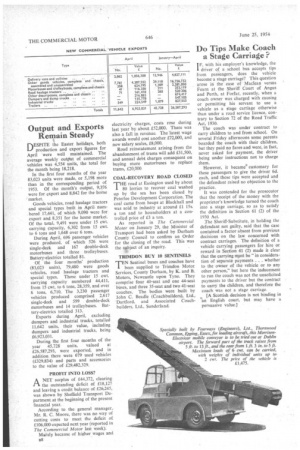Do Tips Make Coach a Stage Carriage ?
Page 42

If you've noticed an error in this article please click here to report it so we can fix it.
IF'with his employer's knowledge, the driver of a school bus accepts tips from passengers, does the vehicle become a stage carriage? This question arose in the case of Maclean versus Fearn at the Sheriff Court of Angus and Perth, at Forfar, recently, when a coach owner was charged with causing or permitting his servant to use a vehicle as a stage carriage otherwise than under a road service licence, contrary to Section 72 of the Road Traffic Act, 1930.
The coach was under contract to carry children to and from school. On several Friday afternoons some parents boarded the coach with their children, but they paid no fares and were, in fact, never asked for payment, the driver being under instructions not to charge them.
However, it became` customary for these passengers to give the driver 6d. each, and these tips were accepted and the defendant raised no objection to the practice.
It was contended for the prosecutor that the receipt of the money with the proprietor's knowledge turned the coach into a stage carriage, so as to satisfy the definition in Section 61(2) of the 1930 Act.
The Sheriff-Substitute, in holding the defendant not guilty, said that the case contained a factor absent from previous decisions on the law concerned with contract carriages. The definition of a vehicle carrying passengers for hire or reward in Section 61 (2) made it clear that the carrying must be "in consideration of separate payments . . . whether to the owner of the vehicle or to any other person," but here the inducement to run the coach was not the unsolicited payments to the driver but the contract to carry the children, and therefore the coach was not a stage carriage.
[A Scottish decision is not binding in an English court, but may have a persuasive value.]




































































































